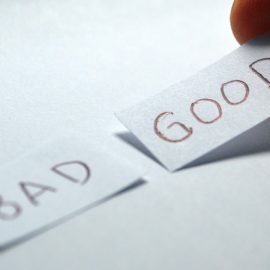

This article is an excerpt from the Shortform book guide to "Codependent No More" by Melody Beattie. Shortform has the world's best summaries and analyses of books you should be reading.
Like this article? Sign up for a free trial here .
What causes codependency traits to form? How are codependency and stress linked? Is there a way to combat codependent tendencies?
In her book Codependent No More, Melody Beattie states that codependency is a reaction to prolonged stress. In most cases, you won’t even realize that your codependent tendencies are forming, because they build up over time.
Below is an exploration into what causes codependency.
The Roots of Codependency
Beattie states that codependency is a reaction to prolonged and often extreme stress. While temporary stress won’t make a big difference in your overall behavior, what causes codependency to form is prolonged and extreme stress does. If your husband is late coming home once, you might worry, but after he gets home safely, you leave the stress behind. When you never know if your husband is coming home, the stress continues and grows every day. And every day, your unhealthy coping mechanisms become more ingrained and habitual.
These habitual coping mechanisms usually result in “reaction mode.” When in reaction mode, you’ll react to things in both healthy and unhealthy ways, but you’ll almost never act on your own volition, Beattie explains. You’ll make decisions solely based on others’ actions and how they make you feel. Instead of being able to make decisions and head off problematic behavior, you’re only able to react after the damage has been done.
Eventually, Beattie notes, even leaving the stress behind isn’t enough to return to normality. Reaction mode has become your new normal, and you subconsciously cling to the same coping mechanisms, even though they have started hurting you rather than helping.
(Shortform note: In business situations, reaction mode occurs when a company cares more about profits than their employees. Companies cut their workforce to save money, and their employees struggle to run the company, reacting to one problem after another. In the same way, codependents don’t allot enough time or attention to themselves, and they struggle to live their lives, reacting to everyone else.)
| How to Escape Habitual Stress Beattie discusses habits in the context of both habitual stress and habitual coping mechanisms. In general, habits can be good. They increase your brain’s efficiency by lessening the energy you spend making everyday decisions. According to Charles Duhigg’s The Power of Habit, 40% of your daily actions are habitual. However, habits can also be dangerous. When a habit forms around a stressful situation, your brain becomes more susceptible to stress. Let’s look at how this works: 1. You experience a stressful situation. Continuing our example, your husband is late coming home. 2. Your brain makes a connection between stress and being away from your husband. 3. The next time you’re away from your husband, you feel stressed and may not know why. If you don’t recognize what’s happening, you can’t counter the stress response. 4. Every time you fail to counter the response, the stress habit grows stronger. To stop this process, identify the habitual stress connection. Your brain is too efficient for you to notice the initial connection, but you can recognize when the connection is being reinforced. For instance, if your husband is at work and you feel stressed, the connection is being reinforced. Take the opportunity to schedule an enjoyable activity; this alters the connection your brain makes and reduces your stress. |
Causes of Stress
Codependency is associated with substance abuse because substance abuse is a clear and persistent cause of stress. However, Beattie argues that codependency can crop up in any situation of “family illness,” when one member of a group has a problem and the repercussions spread to the entire group.
(Shortform note: Most well-known family illnesses are mental disorders, but other situations like high-stress jobs or chronic illness can also cause codependency. While some people living with a family illness experience an increase in motivation in the face of the challenge, most experience depression, anxiety, and resentment for the affected party.)
Underlying Stress
The source of stress is not always as obvious as substance abuse. Beattie emphasizes that some families experience codependency without any clear cause: no history of substance abuse, no highly stressful situation, and no particularly needy family members. So what is the source of the stress? What traps you in reaction mode?
In these cases, the problem is usually the underlying family system, Beattie explains. All families have unspoken rules that govern how members behave and interact with one another. These rules develop naturally and can either help or stifle your family’s communication.
Families that discourage open communication are at high risk for codependency. In a family like this, you feel the need to repress your emotions. You need to be perfect and untroublesome, and you maintain the status quo even when change would be good. The stress of following or reacting to these rules can cause codependency. This kind of codependency is dangerous, Beattie warns, because it’s difficult to detect the source. Underlying family systems have few obvious problems, and there is no established solution as there is for addiction.
| Why It’s Important to Recognize Your Family System Underlying family systems like those Beattie describes are also called rules of engagement, and you learn them through trial and error. When you engage in a certain behavior and receive negative reactions, your brain prohibits the behavior. Some families might have spoken values, such as “You can tell us anything,” but the underlying system enforces the opposite. For example, Mark’s parents say he can tell them anything, but when he shares his problems or feelings, they tell him to man up or brush him off. Common family systems include discouraging talk about feelings or difficult topics, requiring you to act in certain ways because of your age or sex, and enforcing that your worth comes from success. Every family has different rules of engagement, and it causes interpersonal conflict when people’s rules clash. If you grew up not talking about difficult situations, your husband wanting to discuss them feels threatening. If you grew up with a healthy communication dynamic, your friend might seem cold and standoff-ish because she doesn’t open up emotionally. Evaluating your family rules, and trying to understand those of others, can therefore help you foster stronger relationships and practice better communication. If you know your family system discouraged communication, caused stress, and therefore left you at high risk of codependency, be proactive in preventing it by using the techniques discussed in this guide. This is important because there aren’t established solutions for healing family systems like there are for addiction, so you need to take charge of your healing. |
Example #1: Reaction Mode Triggered by Extreme Stress
George is an alcoholic. He regularly goes into town and comes back drunk, or he doesn’t come back until the next morning. His wife Maria never knows where he is or when he’ll be coming back, nor the condition he’ll be in when he does return. When the problem starts, she calls his employers, friends, and favorite bars looking for him. This checking becomes a habit until she calls even when George comes home on time and sober.
Maria is dragged about by her husband’s behavior. She can’t control him; she can only mitigate the damage. After years of living in reaction mode, Maria can’t make decisions. All her choices revolve around George’s actions, even when he starts treatment and the stress is relieved. Reaction mode has become an integral part of how her brain works. It has become a dangerous habit, and Maria might not even realize it exists.
Example #2: Reaction Mode Triggered by Underlying Stress
Bobby grew up in an average, middle-class family. He has no family history of substance abuse, chronic illness, or other obvious family illnesses, and he had an overall pleasant childhood. Externally, everything seemed fine. But under the surface, the family system was putting stress on Bobby that would eventually manifest as codependency. Let’s look at what happened:
Bobby’s family isn’t one for emotional displays. Whether intentionally or not, his parents have shown that such displays are weak, childish, or annoying. They reward restraint and disapprove of complaints. As a result, Bobby grows up repressing his emotions. He doesn’t ask his parents for help because he feels he should handle his problems alone. He feels pressured to always be calm and in control, not letting his desires or emotions impact his actions. When he succeeds, the adults in his life praise him for his maturity. When he fails, people say he needs to grow up.
The family system had a set of rules that dictate actions. Bobby spent his entire life reacting to these rules. Now, years later, he is stuck in reaction mode just as much as Maria, even though his reason for being so is subtler.

———End of Preview———
Like what you just read? Read the rest of the world's best book summary and analysis of Melody Beattie's "Codependent No More" at Shortform .
Here's what you'll find in our full Codependent No More summary :
- What inspired codependency 12 Step Programs around the country
- Explanations, advice, and compassion for people struggling with codependency
- How to practice detachment, self-care, and personal responsibility






